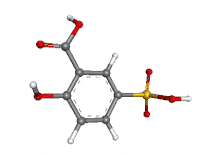5-Sulfosalicylic acid
Appearance

| |

| |

| |
| Names | |
|---|---|
| IUPAC name
2-Hydroxy-5-sulfobenzoic acid
| |
| Identifiers | |
3D model (JSmol)
|
|
| ChEBI | |
| ChEMBL | |
| ChemSpider | |
| ECHA InfoCard | 100.002.324 |
| EC Number |
|
| KEGG | |
PubChem CID
|
|
| UNII | |
CompTox Dashboard (EPA)
|
|
| |
| |
| Properties | |
| C7H6O6S | |
| Molar mass | 218.185 g/mol |
| Melting point | 120 °C (248 °F; 393 K) |
Except where otherwise noted, data are given for materials in their standard state (at 25 °C [77 °F], 100 kPa).
| |
Sulfosalicylic acid is used in urine tests to determine urine protein content. The chemical causes the precipitation of dissolved proteins, which is measured from the degree of turbidity.[1]
It is also used for integral colour anodizing.
With water it is used as a shuttle solution for the CAS assay to test for siderophore.
See also
[edit]References
[edit]- ^ Sulfosalicylic acid Archived 2008-06-19 at the Wayback Machine, Family Practice Notebook website
